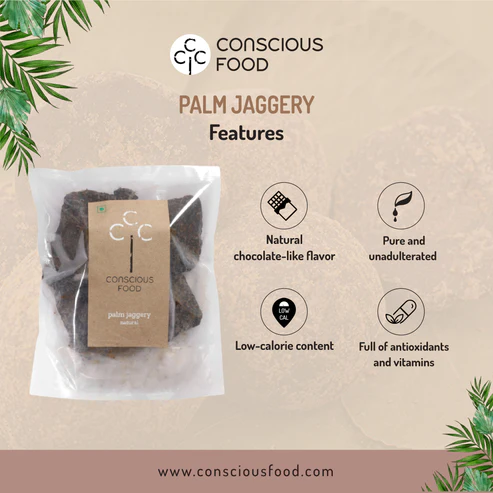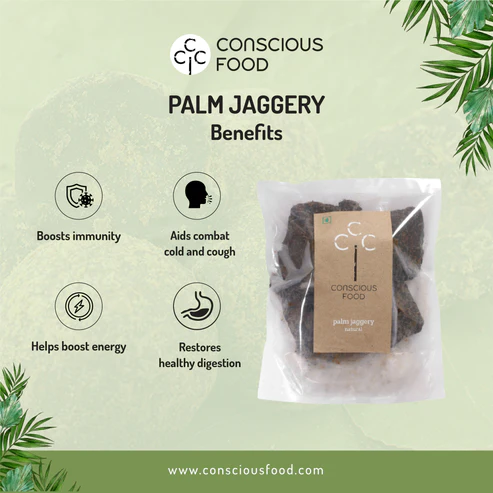Palm Jaggery
Original price was: ₹177.0.₹169.0Current price is: ₹169.0.
Features-
Palm jaggery is made from coconut sap without using any chemicals. It has a natural chocolate-like taste which makes it a great substitute to refined sugar.
 Boosts Immunity
Boosts Immunity Local & Sustainably sourced
Local & Sustainably sourced Full of antioxidants and vitamins
Full of antioxidants and vitamins Healthy refined sugar alternative
Healthy refined sugar alternative Pure & Unadulterated
Pure & Unadulterated
- Description
- Additional information
- Reviews (0)
- Q & A
- Sustainability Remark
- More Offers
- Store Policies
- Inquiries
Uses-
- It Can be used as a substitute to regular sugar
- It Can be used for baking and adds a slight chocolatey flavour to food
- It Can be consumed directly daily to help boost immunity over time
Benefits-
- Excellent source of iron, magnesium and potassium
- Lower in calories than white sugar
- By activating digestive enzymes, the sweetener helps with regular bowel movement and cleanses the system
- Ingredients: 100% Palm Jaggery
- Shelf Life: 9 months
| Weight | 500 kg |
|---|---|
| brands | CONSCIOUS FOOD |
You must be logged in to post a review.
Q & A
Organic products, such as organic honey and organic sugar (including jaggery), can be considered more sustainable than their non-organic counterparts in several ways.
Firstly, organic farming practices generally rely on natural methods of pest and weed control, as well as sustainable soil management techniques, such as crop rotation and composting. This reduces the need for synthetic fertilizers and pesticides, which can have negative impacts on soil health, water quality, and wildlife.
Furthermore, organic farming practices prioritize biodiversity and ecosystem health, which can lead to better soil health, improved water quality, and increased carbon sequestration. This can help mitigate climate change and support long-term sustainability.
In terms of the specific products mentioned, organic honey is produced by beekeepers who use natural and sustainable methods to maintain bee health and avoid the use of synthetic pesticides and antibiotics. This can help protect pollinators and support the overall health of ecosystems.
Organic sugar (including jaggery) is produced from organically grown sugar cane or sugar beets, which are cultivated without synthetic fertilizers and pesticides. This can help prevent soil degradation and water pollution, while also supporting the health of farm workers and local communities.
Overall, choosing organic products such as organic honey and organic sugar (including jaggery) can be a more sustainable choice, as they support environmentally friendly and socially responsible farming practices.
General Inquiries
There are no inquiries yet.





















Reviews
There are no reviews yet.